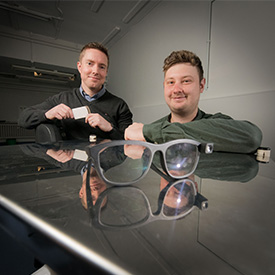-
Study
Study
Interested in studying at Northumbria? With 31,500 students, Northumbria is one of the largest universities in the country, offering courses on either a full-time, part-time or distance learning basis.
Discover more-
Undergraduate
- Undergraduate Study Degree
- Undergraduate Open Day & Events
- Application Guides
- Northumbria University UCAS Exhibitions
- Foundation Years
- Undergraduate Fees & Funding
- School & College Outreach
- Continuing Professional Development
-
Postgraduate
- Postgraduate Study Degree
- Postgraduate Research Degrees
- Postgraduate Open Days and Events
- Postgraduate Fees & Funding
- Flexible Learning
- Thinking about a Masters?
- Continuing Professional Development
- Change Direction
-
Student Life
- The Hub - Student Blog
- Accommodation
- Life in Newcastle
- Support for Students
- Careers
- Information for Parents
- Students' Union
- Northumbria Sport
-
-
International
International
Northumbria’s global footprint touches every continent across the world, through our global partnerships across 17 institutions in 10 countries, to our 277,000 strong alumni community and 150 recruitment partners – we prepare our students for the challenges of tomorrow. Discover more about how to join Northumbria’s global family or our partnerships.
Discover more-
Applying to Northumbria
- European Union
- Our London Campus
- Northumbria Pathway
- International Events
- Entry Requirements
- Agent Network
-
Northumbria Language Centre
- Faculty Requirements
- Acceptable English Requirements
- Pre-Sessional English and Study Skills
- Academic Language Skills Programmes (ALS)
-
International Fees, Funding & Scholarships
- International Undergraduate Fees
- International Undergraduate Funding
- International Masters Fees
- International Masters Funding
- International Postgraduate Research Fees
- International Postgraduate Research Funding
- International Money Matters
-
Life at Northumbria
- International student support
- The Hub - Student Blog
- Careers
-
International Mobility
- Current Northumbria Students
- Incoming Exchange Students
-
-
Business
Business
The world is changing faster than ever before. The future is there to be won by organisations who find ways to turn today's possibilities into tomorrows competitive edge. In a connected world, collaboration can be the key to success.
Discover more -
Research
Research
Northumbria is a research-rich, business-focused, professional university with a global reputation for academic quality. We conduct ground-breaking research that is responsive to the science & technology, health & well being, economic and social and arts & cultural needs for the communities
Discover more -
About Us
-
About Northumbria
- Our Strategy
- Our Staff
- Our Partners
- Student Profiles
- Alumni Profiles
- Leadership & Governance
- Academic Departments
- University Services
- History of Northumbria
- Contact us
- Online Shop
-
-
Alumni
Alumni
Northumbria University is renowned for the calibre of its business-ready graduates. Our alumni network has over 236,000 graduates based in 178 countries worldwide in a range of sectors, our alumni are making a real impact on the world.
Discover more - Work For Us
What will I learn on this module?
This module will introduce you to the theories, models and concepts which underpin the provision of midwifery care. It is a year long module and is aligned to Midwifery Practice 1, to ensure the integration of theory and practice.
You will be introduced to the universal care provided by midwives to women, neonates, partners, fathers and families during the childbirth continuum. This will include principles of holistic assessment and screening, and the role of the midwife in providing information and support, for example about minor disorders and complications, lifestyle changes during pregnancy and the care needs of the newborn. You will learn about the signs and symptoms of pregnancy, how to care for a woman during labour and birth and the midwife’s role in providing care after the birth, including support for infant feeding and maternal/paternal-infant relationship building.
As a midwife you will also care for and support women, newborn infants and their families who require additional care and collaboration with interdisciplinary and multi-agency colleagues, whilst ensuring continuity and coordination of midwifery care. You will be involved in first line assessment and management of social, medical, obstetric, neonatal, and mental health complications. The module therefore introduces you to the range of knowledge and skills required to begin to recognise and care for women and their families with additional needs throughout the childbirth continuum. You will study a range of subjects to facilitate this learning and support your development as a safe and effective practitioner, complementing the provision of universal care.
Physiological adaptations will be explored, including female and male reproductive anatomy and physiology, changes during pregnancy, the process of labour and adaptations following birth. You will study the development of the embryo, fetus and placenta, as well as an overview of body systems, such as the cardiovascular and immune systems, and will be introduced to relevant genetics and genomics. You will begin to develop your knowledge of pathophysiology alongside this core knowledge, whilst considering how the midwife can optimise normal physiological processes for every woman and family.
Evidence based practice is central to the provision of midwifery care and the module will develop your ability to identify and use appropriate evidence to support your practice. Equally important will be the recognition of the diverse needs of women, partners and fathers, and all topics will be considered with reference to the professional expectations of compassion, respect and inclusivity, as described in The NMC Code and the NMC Future Midwife standards.
How will I learn on this module?
On this module, you will engage with a variety of teaching and learning strategies including lectures, seminars and directed learning e.g. online activities and workbooks. Activities will be blended to create a mix of face to face and online activities supported by the University’s Electronic Learning Platform (eLP), Blackboard Ultra. Women and families’ voices and experiences will be integral to learning activities within the module, which offers opportunities to engage with service users (and/or their representatives) who have a diverse range of needs, for example those with learning disabilities. Also, practice scenarios which illustrate women’s journeys andstories will aid in the application of theory. Lectures will introduce key concepts in relation to anatomy and physiology, midwifery assessment, screening and care planning. Concepts will then be further explored within seminars and workshops, where you will learn collaboratively with and from other students.Inter professional learning opportunities with other health and social care students will develop your communication and team working skills as well as an understanding of the roles of others. Clinical skills sessions will facilitate skill development and refection, peer support and feedback through experiential approaches to learning.
You will be introduced to the University Library and the digital resources to support your academic development. A fundamental aspect of learning on the module will come from self-reflection of your own academic and professional development, supported by your personal tutor.
How will I be supported academically on this module?
As a key year one module, the role of the Personal Tutor will be introduced within module tutorials, and an initial self-assessment and evaluation of learning needs will form part of that relationship and contribute to achievement of the module outcomes. The academic staff involved in delivering this module will also provide guidance, to ensure that you are able to confidently engage with the module content. Learning materials, including directed and e-learning will be made available on the eLP. Seminars will form an opportunity for peer support and feedback throughout the module, helping you to develop the evaluation and feedback skills required for effective professional practice and lifelong learning. You will also receive formative feedback from academic staff informally during seminars, to enable you to review your learning in a safe and supportive environment. Group tutorials will further support preparation for the module assessment.
In addition, the module will be supported by University library staff and resources, including study skills support packages. You can access the interactive training via the library webpages or the following link: http://library.northumbria.ac.uk/learning-skills
Ask4Help online (accessed through your student portal) provides a comprehensive range of answers to frequently asked questions and is of benefit to students as a central point of reference for information about many different topics. Ask4Help face to face service points include that located at Coach Lane Library (ground floor).
What will I be expected to read on this module?
All modules at Northumbria include a range of reading materials that students are expected to engage with. The reading list for this module can be found at: http://readinglists.northumbria.ac.uk
(Reading List service online guide for academic staff this containing contact details for the Reading List team – http://library.northumbria.ac.uk/readinglists)
What will I be expected to achieve?
You will be expected to:
Knowledge & Understanding:
1. Demonstrate understanding of reproductive health and physiology during the perinatal period.
2. Demonstrate understanding of perinatal psychological wellbeing and the wider determinants of health and illness.
3. Critique the role of the midwife across the diversity of practice, and the impact of additional needs on women, neonates and their families.
Intellectual / Professional skills & abilities:
4. Critically reflect on the midwife’s role in optimising normal physiological processes when working with women, infants and families, including those with additional care needs.
5. Review and evaluate the evidence base for care.
6. Demonstrate capability in the presentation of a diverse range of evidence.
Personal Values Attributes (Global / Cultural awareness, Ethics, Curiosity) (PVA):
7. Demonstrate an awareness of the knowledge and skills required to provide respectful and effective care to all women and their families.
How will I be assessed?
Formative assessment:
Ongoing feedback will be available from tutors throughout the module following directed activities such as seminars and following completion of e-learning activities. Workbooks and sample questions will be used to facilitate formative learning.
Summative assessment:
1. A 90 minute multiple choice question (MCQ) and short answer exam (50%)
(MLO 1,2)
2. 30 minute presentation of an A2 sized poster (50%) relating to an aspect of midwifery care, with annotated bibliography (MLO 3, 4, 5, 6, 7)
Written feedback will be provided via Turnitin.
Pre-requisite(s)
N/A
Co-requisite(s)
N/A
Module abstract
This module will provide the relevant, evidence-based anatomy and physiology knowledge and skills to enable you to understand the role of the midwife in optimising physiological and psychological processes. It will also introduce complexity and foundation knowledge for recognising additional care needs. The module is a combination of lectures, seminars and workshops, as well as online supported learning which will expose you to women’s journeys and experiences within maternity care. Targeted formative assessment and feedback will prepare you for the summative assessmentand for future learning across the programme.
Course info
Credits 40
Level of Study Postgraduate
Mode of Study 3 years Full Time
Department Nursing, Midwifery & Health
Location Coach Lane Campus, Northumbria University
City Newcastle
Start January 2025
All information is accurate at the time of sharing.
Full time Courses are primarily delivered via on-campus face to face learning but could include elements of online learning. Most courses run as planned and as promoted on our website and via our marketing materials, but if there are any substantial changes (as determined by the Competition and Markets Authority) to a course or there is the potential that course may be withdrawn, we will notify all affected applicants as soon as possible with advice and guidance regarding their options. It is also important to be aware that optional modules listed on course pages may be subject to change depending on uptake numbers each year.
Contact time is subject to increase or decrease in line with possible restrictions imposed by the government or the University in the interest of maintaining the health and safety and wellbeing of students, staff, and visitors if this is deemed necessary in future.
Your Learning Experience
Find out about our distinctive approach at
www.northumbria.ac.uk/exp
Admissions Terms and Conditions
northumbria.ac.uk/terms
Fees and Funding
northumbria.ac.uk/fees
Admissions Policy
northumbria.ac.uk/adpolicy
Admissions Complaints Policy
northumbria.ac.uk/complaints














